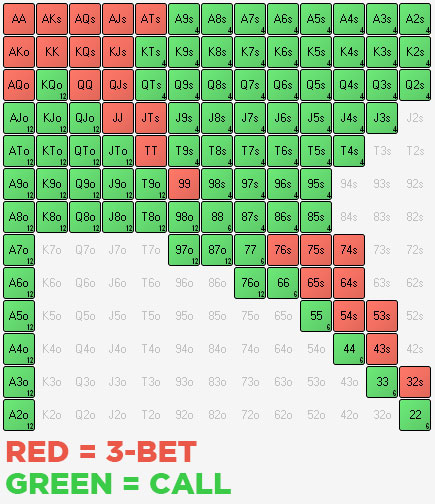I’ve been playing a fair amount of $1/$2 short-handed pot-limit Omaha recently. After a few weeks of grinding these stakes and talking with other respected players, I’ve come to believe that there’s more money to be made grinding PLO than NLHE. The reason for this is NLHE has become too damn efficient. Open up a six-handed NLHE table and you can be sure five of the players are regular grinders. There’s just not as much money up for grabs at the NLHE tables as their used to be, especially at stakes of $1/$2 and higher. I’m not saying you can’t make money grinding NLHE, I’m just saying I think you can make more grinding PLO.
By my observation, the average player at a six-handed $1/$2 PLO table is pretty bad. In several dozen sessions of two-tabling these stakes, there have only been two instances that I left a table on account of deciding it was too tough. For the most part, there’s always some good spots at the table.
“Let Others Go Nuts”: Matt Jarvis Offers 6-Max No-Limit Hold'em Tourney Advice. PokerNews’ Remko Rinkema about short-handed NLHE strategy. Strategy live poker online poker cash game.
6-max small stakes games are where things start to get more serious.Where players can win with very basic strategy in the micro stakes, there are a lot more full time players and tough opponents to deal with in the small stakes. This is a discussion on 9 handed vs 6 handed within the online poker forums, in the Cash Games section; Something I've noticed is a lot of people taking their tournament game to a cash table, when.
I’ve been winning 1/3rd of the pots at a table with six players. That tells me one thing: people are playing too tight. Omaha starting hands are not nearly as important as Texas hold’em starting hands. In Texas hold’em, the difference between the value of a great starting hand and a mediocre starting hand is huge. In Omaha, it’s not a big difference. For that reason, I open a lot of pots with raises. This has a two-fold benefit of a.) helping me win a lot of small pots and b.) build a really aggressive image to get paid off better when I make a big hand.
Another thing that has made my sessions at these tables profitable is from benefiting from opponents who don’t understand how to value-bet. There have been countless instances where I will check to my opponent on the river thinking, “hmm, I’d probably call a half-pot sized bet with this hand,” only to see my opponent check-behind and turn over like the 5th nuts with a ten-high flush or something. Are they really that afraid of being river check-raised?!?

I save a lot of money thanks to opponents who let me off the hook holding strong two pairs or small flushes because they’re worried I’m going to call or raise with a better hand. In a full-ring Omaha table, this level of paranoia can be good, but in a six-handed game where relative hand strength goes up, they’re just pissing away value by not putting in bets on the river.
One final spot that I’d like to touch on is when a tight player re-raises for the size of the pot before the flop. In my experience, this is almost always some type of Ace-Ace-x-x hand. It seems that a lot of Omaha players have “hold’emitis” and get too attached to Ace-Ace-x-x hands. When I make a raise to $6 and my opponent re-pots it to $21, I will happily call with any hand I was willing to open to $6 in the first place hoping to hit the flop hard and get them to commit their chips drawing very thin with just an overpair of Aces. Even if I miss the flop, it’s usually pretty easy to buy the pot when a scary flop like Eight-Seven-Six two-suited comes.
6 Handed Cash Poker Strategy Free

6 Handed Cash Poker Strategy Chart
If you’re finding the edges in NLHE harder and harder to come by, give PLO a try. When it comes to grinding cash games online, PLO is the new NLHE!